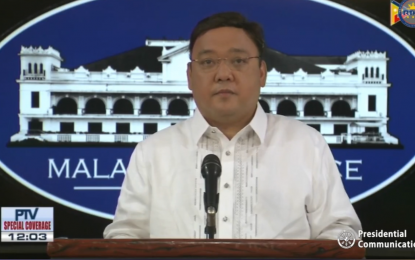
Presidential Spokesperson Harry Roque. (File photo)
MANILA – Armed Forces of the Philippines (AFP) chief-of-staff, Gen. Felimon Santos Jr. had no “bad intentions” in requesting the help of Chinese Ambassador Huang Xilian in obtaining off-label medicine used to treat the symptoms of coronavirus disease 2019 (Covid-19), Malacañang said on Tuesday.
Presidential Spokesperson Harry Roque made this statement after Santos sent a letter to the envoy requesting his “assistance in the procurement of five boxes of Carrimycin tablets which is available only in China”.
Santos “recalled” the letter after learning that the Carrimycin has not been approved for use by the Food and Drug Administration (FDA).
“I don’t think naman there was any evil motive behind the actions of our good general,” Roque said in a virtual presser.
Citing Santos himself, Roque said the Carrimycin tablets helped the AFP chief's recovery from Covid-19 infection.
“Eh ‘yun po yung nagpagaling sa kanya so nais lang niya na sana mapabilis yung proseso na magamit din natin (This was what helped his recovery so he wanted to speed up the process so that we may also use it),” he said.
Roque, meanwhile, encouraged pharmaceutical companies that imported medicines to treat Covid-19 symptoms to have their drugs submitted to the FDA for approval.
“I would encourage na kung sino man po ang mag-i-import niyan na mag-apply na po sa FDA dahil ang pangako naman ng FDA meron tayong simplified process (I would encourage that whoever would import that medicine to apply at the FDA because the FDA promised to simplify the process),” he said.
He said drugs registered in foreign countries and drugs classified as traditional medicine may be considered for immediate FDA approval.
“He had no bad intentions but the drug has to be registered with the FDA,” Roque said.
Roque also ruled out the possibility that Santos had violated any laws.
“According to the law he did not commit any crime too dahil hindi naman siya nag-i-import at hindi siya nagbebenta nitong (gamot) na ito (because he did not import and he did not sell this drug),” he said.
Defense Secretary Delfin Lorenzana, meanwhile, echoed Roque's remarks.
"General Santos was infected with (Covid-19) and, although asymptomatic, went through the fear and anguish of being infected with a deadly virus. One of the medicines he took was Carrymicin, which was given to him by a (Filipino-Chinese) friend and accordingly, this medicine is controlled by the Chinese government," Lorenzana said in a statement.
He added that he does not see anything wrong with Santos' motive of helping friends infected with Covid-19.
"The letter may have been out of place, i.e., should have been coursed through the DFA (Department of Foreign Affairs). He had not violated any regulations nor imperiled the security of the country. Let us put the matter to rest," Lorenzana said.
AFP spokesperson, Marine Brig. Gen. Edgard Arevalo, meanwhile, said Santos acted in good faith over the matter.
"The letter is authentic. The CSAFP (Chief-of-Staff AFP) acted in good faith. We do not see any conflict of interest. This is about medicine that the AFP Chief feels can save people’s lives. That is more compelling," Arevalo said in a statement.
Currently, there are no registered drugs or vaccines that are licensed specially for the use in Covid-19 treatment or prevention.
However, there are ongoing clinical trials to investigate the safety and efficacy of new and existing drugs, such as anti-viral, anti-bacterial, and anti-malarial agents in the treatment of Covid-19 patients.
Santos’ initial effort to procure medicine from China earned public criticism, since it comes after the Philippines lodged two diplomatic protests against China for violating international law and Philippine sovereignty.
Foreign Affairs Secretary Teodoro Locsin Jr. said Manila filed two protests against Beijing for pointing a radar gun at a Philippine Navy ship and declaring a Philippine territory as part of Hainan province near the Philippine-occupied Rizal Reef in the Kalayaan Island Group on February 17. (with reports from Priam Nepomuceno/PNA)
